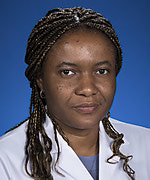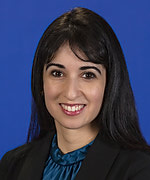Cardiovascular Medicine
Cardiac Amyloidosis Program
Amyloidosis is a condition where proteins in the body misfold into a shape that allows them to form into amyloid fibrils and deposit in organs throughout the body. While the amyloid fibrils build up, the organs may not work as well as before.
Different proteins may cause amyloidosis. In order to choose the best therapy, it is necessary to determine which protein is responsible. The most common types of amyloidosis are light chain (AL) and transthyretin (ATTR) amyloidosis.
A risk factor is anything that increases a person’s chance of developing a disease. Although risk factors often influence the development of a disease, most do not directly cause the disease itself. Some people with several risk factors may never develop amyloidosis, while others with no known risk factors do.
Although the root cause of amyloidosis is unknown, there are several risk factors for cardiac amyloidosis, including age, gender, family history and race.
Transthyretin (TTR) mutations more commonly affects black populations in the U.S. 3.4% of African Americans have Val122Ile mutation which usually results in isolated cardiomyopathy. In Europe and Asia, mutations of TTR may lead to both cardiac involvement and familial amyloid polyneuropathy most often caused by Val30Met mutation.
Although amyloidosis is a rare disease, it is under-diagnosed. Many people die from complications of amyloidosis without ever receiving a diagnosis.
At UC Davis, your physician begins by conducting a complete medical history and physical exam.
Various tests may be used to diagnose amyloidosis and identify the responsible protein.
Technetium Pyrophosphate (PYP) Scan
This bone scan can detect ATTR in the heart. A blood test is then used to determine if the amyloidosis is hereditary or wild-type
Endomyocardial Biopsy
A biopsy takes small piece of tissue from the body for examination by a pathologist. This identifies the protein responsible for amyloidosis.
Our physicians work with you to provide the best possible treatment plan for this complex disease. The UC Davis Amyloid Center is at the forefront of amyloidosis treatment and research.
Our expansive clinical trials, novel approaches to early identification and dedication to learning more about the disease and advancing treatment options is a testament to our commitment to managing amyloidosis. Our center provides an integrated, multidisciplinary approach to the care of our patients.
Coordinated care and treatment of amyloidosis
Because amyloidosis affects multiple organs in the body, it is important to have a comprehensive and coordinated treatment plan that addresses all aspects of the disease.
At our center, we bring together experts across multiple specialties who develop an individualized treatment plan for you.
Our team includes UC Davis specialists in the following areas
- Cardiology
- Hematology
- Nephrology
- Otolaryngology
- Rheumatology
-
Aaron Seth Rosenberg, M.D., M.S.
-
Ge Xiong, M.D., Ph.D.
-
Shubha Ananthakrishnan, M.D.
-
Nayereh Pezeshkian, M.D.
-
Colette P. DeFilippo, M.S., C.G.C.
-
Fatma Sen, M.D., M.Sc.
-
Imo A. Ebong, M.B.B.S., M.S.
-
Martin Cadeiras, M.D.
-
Shirin Jimenez, M.D.
-
Michael Austin Gibson, M.D.
- Genevieve Lynch N.P
- Jayme Taylor, R.N.
- Veronicah Mwathi R.N.
- Rachelle Cook, N.P.
- Svetlana Goldman, PharmD, BCACP, CDCES
- Yvette Mitchell PharmD
- Kathie Tran, PharmD
- Erin Hilario, CPhT
- Mahealani Spencer, CPhT










